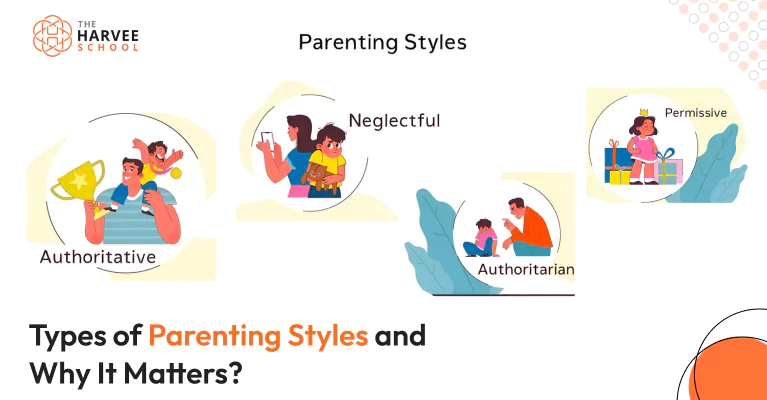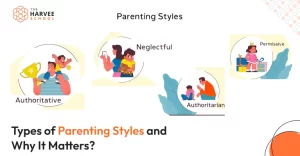Types of Parenting Styles and Why It Matters?
Parenting is one of the most significant responsibilities in life. The way parents nurture, guide, and discipline their children shapes their personality, confidence, and future success. Researchers have identified different parenting styles, each with a unique impact on a child’s development.
Understanding different parenting styles helps parents choose the best approach to raising well-rounded and happy kids. This blog will explore the four major parenting styles, their characteristics, and why they matter.
The 4 Main Types of Parenting Styles
1. Authoritative Parenting
Authoritative parenting is a balanced approach where parents set clear expectations while also being responsive and supportive.
Characteristics:
- Establish clear rules with explanations
- Encourage independence while maintaining discipline
- Use positive reinforcement and open communication
- Show warmth, love, and support
Impact on Children:
Children raised under authoritative parenting tend to be confident, responsible, and socially competent. They develop strong problem-solving skills and maintain healthy relationships in the future.
2. Authoritarian Parenting
Authoritarian parents impose strict rules and expect obedience without considering the child’s opinion.
Characteristics:
- High expectations with little flexibility
- Punishment for mistakes rather than guidance
- Less emotional warmth and communication
- Focus on discipline and structure
Impact on Children:
Children may develop low self-esteem, fear making mistakes, and struggle with social interactions. They often lack decision-making skills and may become either rebellious or overly dependent.
3. Permissive Parenting
Permissive parents are lenient and avoid enforcing strict rules, allowing children to make their own decisions.
Characteristics:
- Few rules and minimal discipline
- More of a friend than an authoritative figure
- High responsiveness with low demand
- Tends to spoil children with leniency
Impact on Children:
Children raised with permissive parenting may struggle with self-control and responsibility. They might have difficulties following rules and handling challenges independently.
4. Neglectful (Uninvolved) Parenting
Neglectful parenting involves a lack of emotional involvement, guidance, and support for the child.
Characteristics:
- Minimal supervision and attention
- Little to no emotional warmth
- Few expectations or rules
- More focused on their own needs than the child’s
Impact on Children:
Children raised in neglectful environments often struggle with emotional regulation, low self-esteem, and difficulty forming healthy relationships. They may feel unworthy of attention and support, leading to long-term psychological issues.
Why Parenting Styles Matter?
1. Shapes Emotional and Social Development
The way parents interact with their children determines how they manage emotions, handle relationships, and face challenges.
2. Impacts Academic Performance
Studies show that children with authoritative parents tend to perform better in school due to structured discipline and encouragement.
3. Influences Mental Health
A positive parenting approach fosters resilience, self-confidence, and emotional stability, reducing the risk of anxiety and depression.
4. Affects Future Relationships
Children learn relationship patterns from their parents, influencing their ability to build healthy connections in adulthood.
Which is the Right Parenting Style?
The authoritative parenting style is considered the most balanced and effective approach for a child’s overall development. It strikes a balance between discipline and warmth, promoting a child’s emotional, social, and intellectual growth. Studies show that children raised with authoritative parenting tend to be more confident, responsible, and emotionally secure.
While parenting isn’t one-size-fits-all, incorporating the principles of authoritative parenting—such as setting clear rules, fostering communication, and providing emotional support—can help parents raise well-rounded individuals.
How to Choose the Right Parenting Style?
Find a balance: Aim for authoritative parenting by setting clear rules while being nurturing.
Be consistent: Children need stability and clear expectations to thrive.
Encourage open communication: Listen to your child’s feelings and opinions to build trust.
Adapt to your child’s needs: Every child is different, and flexibility helps in their development.
Conclusion
Parenting styles play a crucial role in shaping a child’s future. While authoritative parenting is often the most beneficial, understanding different approaches allows parents to adjust and create a nurturing environment. By fostering emotional support, discipline, and guidance, parents can raise happy, confident, and successful children.






